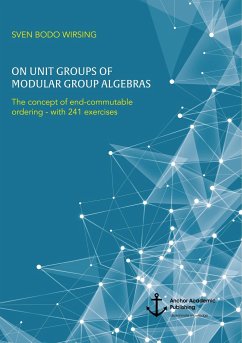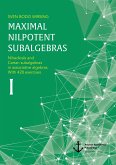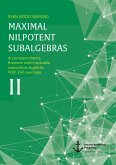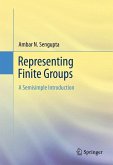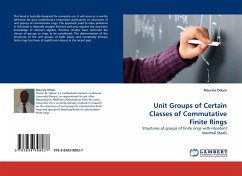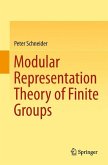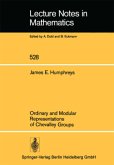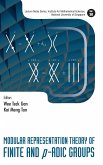In this book we analyse unit groups of group algebras KG for non-abelian p-groups G and fields K of characteristic p. By calculating the core and the normaliser of U in 1 + rad(KG) - the group of normalized units -- for every subgroup U of G, we generalise results of K.R. Pearson and D.B. Coleman using fixed points of enhanced group actions.
Our concept of so-called end-commutable ordering leads to a new method of studying the center of 1 + rad(KG). We proof that a finite group G is nilpotent if and only if every conjugacy class possesses an end-commutable ordering. As a simple consequence we get a result of A.A. Bovdi and Z. Patay, which shows how the exponent of the center of 1 + rad(KG) can be determined by calculations purely within the group G.
We describe the groups for which this exponent is extremal and calculate the exponent for various group classes (e.g. regular groups, special groups, Sylow subgroups of linear and symmetric groups) and group constructions (e.g. wreath products, central products, special group extensions, isoclinic groups).
Another application of our concept of end-commutable ordering is a description of the invariants of the center of 1 + rad(KG) for a finite field K. They are determined purely by the group G and the field K and can be visualized by a special graph - the class-graph.
As a consequence of our results we prove that the center, the derived subgroups and the p-th-power subgroup of 1 + rad(KG) are not cyclic. Furthermore, we obtain some properties of unit groups of group algebras for extra-special 2-groups and fields of characteristic 2.
Finally, we investigate the behaviour of the center and other characteristics (e.g. the exponent, the class of nilpotency, the Baer length, the degree of commutativity) for the chain of iterated unit groups of modular group algebras. For this, we use Lie and radical algebra methods.
Our concept of so-called end-commutable ordering leads to a new method of studying the center of 1 + rad(KG). We proof that a finite group G is nilpotent if and only if every conjugacy class possesses an end-commutable ordering. As a simple consequence we get a result of A.A. Bovdi and Z. Patay, which shows how the exponent of the center of 1 + rad(KG) can be determined by calculations purely within the group G.
We describe the groups for which this exponent is extremal and calculate the exponent for various group classes (e.g. regular groups, special groups, Sylow subgroups of linear and symmetric groups) and group constructions (e.g. wreath products, central products, special group extensions, isoclinic groups).
Another application of our concept of end-commutable ordering is a description of the invariants of the center of 1 + rad(KG) for a finite field K. They are determined purely by the group G and the field K and can be visualized by a special graph - the class-graph.
As a consequence of our results we prove that the center, the derived subgroups and the p-th-power subgroup of 1 + rad(KG) are not cyclic. Furthermore, we obtain some properties of unit groups of group algebras for extra-special 2-groups and fields of characteristic 2.
Finally, we investigate the behaviour of the center and other characteristics (e.g. the exponent, the class of nilpotency, the Baer length, the degree of commutativity) for the chain of iterated unit groups of modular group algebras. For this, we use Lie and radical algebra methods.

